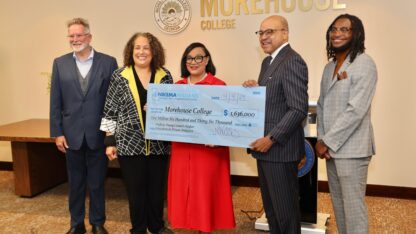DeVos: Student loan debt is a higher education ‘crisis’

U.S. Education Secretary Betsy DeVos, pictured during a 2017 visit to Georgia State University, was back in Atlanta on Tuesday to discuss student loan debt.
Al Such / WABE file
U.S. Education Secretary Betsy DeVos spoke in Atlanta Tuesday at the Federal Student Aid (FSA) Training Conference at the Georgia World Congress Center. DeVos said FSA, which is an office of the education department, currently holds $1.5 trillion in outstanding student loans.
“We have a crisis in higher education,” DeVos said. “Our higher education system is the envy of the world, but if we, as a country, do not make important policy changes in the way we distribute, administer, and manage federal student loans, the program on which so many students rely will be in serious jeopardy.”
According to The Institute for College Access and Success, the average public college student in Georgia graduates with $28,653 of debt.
DeVos said FSA has a consumer loan portfolio larger than any private bank, making it the largest direct loan portfolio in the federal government.
“Last year uncollateralized student loans, which is all of them by the way, accounted for over 30 percent of all federal assets,” she said. “One-third of the balance sheet.”
20 percent of all federal student loans are delinquent or in default, she said. DeVos added the debt level of individual borrowers has ballooned since 2010 when the Obama administration overhauled the loan program.
DeVos didn’t offer concrete solutions but said the country needs to make better use of human capital, unleash innovation and provide more information for families.
She also touted changes her department has made on the front end of the loan process. A new app allows students to enter financial information directly to the Free Application for Federal Student Aid (FAFSA) form. Students have to complete the form to be considered for aid.
FSA CEO James Manning announced his office has been working with Congress and the Internal Revenue Service to let students import their financial information more easily into the FAFSA form.
He also said FSA will let colleges accept a personal copy of a family’s tax returns to satisfy income verification so that students don’t have to depend on the IRS for that. Manning added that college financial aid administrators can also accept a signed statement from families who aren’t required to file taxes instead of awaiting IRS verification.








